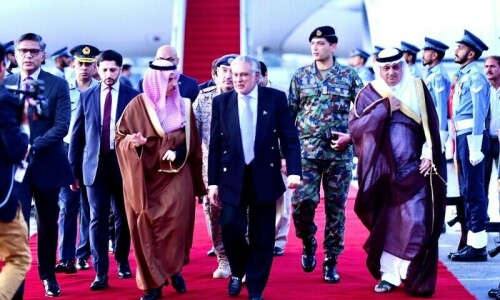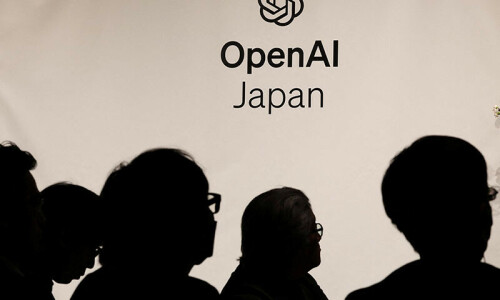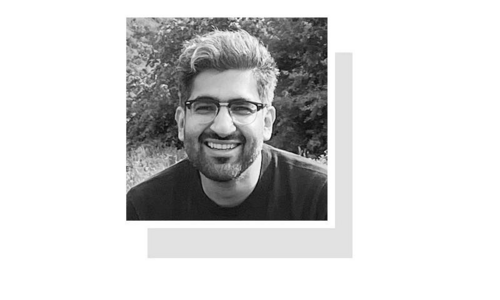KARACHI: It does not happen very often when Karachi’s intellectual crème de la crème gather under one roof. It happened on Saturday evening when a book detailing the movement for freedom of expression of 1977-78 titled Sab Se Bari Jang, written and compiled by eminent journalist and poet Ahfazur Rehman, was launched at the Arts Council.
Mehnaz Rehman, rights activist and Ahfazur Rehman’s wife, gave a heartfelt account of the troubles she and her husband had to face during Gen Ziaul Haq’s rule as they fought for freedom of the press.
She narrated the story of the times when Ahfaz went underground as security agencies looked to arrest him. Once they came to the couple’s rented house but Ahfaz wasn’t there. This perturbed the owner of the house and he asked them to vacate it. It made Mehnaz shift to her parents’ place, and security personnel even reached there.
Mehnaz said Ahfaz had written the book while battling cancer, which was why it was not only an account of the 1970s movement but had also become a metaphor for life’s struggle. Ahfaz’s fighting spirit had enabled him to triumph over the deadly disease, she added.
Dr Syed Jaffer Ahmed said there were many kinds of books that focused on the field of journalism: some of which told the reader about the profession but did not look at things with a critical eye; others had journalists pen biographies in the context of their profession.
But seldom did a book appear which entailed both individual and collective struggles of journalists. He lamented that today there were elements in the media which kept repeating Pakistan’s national narrative (qaumi bayanyey) but conveniently ignored the workers’ movements in the past or the Hari tehreek or the movements that took place in factories in East Pakistan.
Dr Ahmed said Ahfaz had penned a book about the country’s most oppressive military regime (of 1977). The author himself had a leading role to play in it, and if he hadn’t done it, an important document in history would have been lost.
He informed the audience, which, like the speakers of the event, had turned up in a big number, that the book was divided into two parts. The first part was about his own writings and analyses on the movement and journalists’ travails, and it would not be possible to read them without a welled-up eyes. The second consisted of articles and letters written at the time by some other people.
Dr Ahmed said the book delineated the difference between democracy and dictatorship, which should be read against the backdrop of the long struggle of pro-democracy people. It was not written with any kind of nostalgia, but intended to create a dialogue between the present and the past.
If on the one hand it drew our attention to how the journalist community dealt with a difficult time, on the other hand it underlined the trends that were in vogue in those days comparing them to the trends that had emerged in the media in the last 15 years. He argued that today media owners were being more stringent in their approach to journalists but nobody was protesting against it.
Dr Ahmed said the message of the book focused on the fact that no movement could limit itself to one field — it needed to broaden its horizon. If it did not do that, it would not be able to achieve success even in the field from where it originated.
That is why, he reasoned, the 1977 movement succeeded to make its mark despite the ruthless methods adopted by the military regime to gag journalists’ voices. He said Ahfaz was also able to highlight some very important workers and leaders of the movement, foremost of which was the late Minjah Barna. He said that since the writer was a poet also, the reader could enjoy the eloquent use of his language in the book.
G. N. Mughal told quite a few heart-wrenching stories of those days underlining the courage of journalists such as Afhazur Rehman, Sabihuddin Ghausi, Shabbar Azmi and Wali Mohammad Raja.
Abdul Hameed Chhapra said Ahfaz was a practical man.
Mairaj Mohammad Khan presided over the launch. Khawar Naeem Hashmi was the chief guest. The list of speakers included Ghazi Salahuddin, Zahida Hina, Farhad Zaidi, Tahir Najmi and Fehmida Riaz. Fazil Jamili conducted the event.
Published in Dawn, May 17th, 2015
On a mobile phone? Get the Dawn Mobile App: Apple Store | Google Play












































Dear visitor, the comments section is undergoing an overhaul and will return soon.